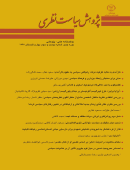معنای حاکمیت در اندیشة «هابز» بر اساس تفسیر او از کتاب مقدس
محورهای موضوعی : پژوهش سیاست نظریحسن قاسمی 1 , ابوالفضل شکوری 2
1 - دانشگاه تربیت مدرس
2 - دانشگاه تربیت مدرس
کلید واژه: حاکمیت هابز کتاب مقدس حقوق طبیعی و تفسیر,
چکیده مقاله :
مسئلة حاکمیت در دین، محل مناظرات طولانی بوده است که با پیگیری تفاسیر این مفهوم در متون مقدس، آرای مختلفی را می توان دید. «توماس هابز»، نظریهپرداز حاکمیت در اوایل دورة مدرن با تفسیر کتاب مقدس و بر اساس روششناسی علمی خود، نقش بسزایی در تدقیق رابطة دو حوزۀ حاکمیت و دین داشته است. این مقاله، تحول در مفهوم حقوق طبیعی را همچون پل واسط میان حاکمیت و دین در نظریة هابز برجسته می کند و با تطبیق این مفهوم در تفسیری که هابز از کتاب مقدس دارد، مدعی است که هابز، مؤلفة اصلی نظریة خود یعنی قرارداد اجتماعی را در خوانش متن مقدس گنجانده و آن را به نفع مرجعیت یک حاکم مقتدر که در پی صلح و امنیت فرد و به طور کلی حفظ حقوق طبیعی فرد است، تفسیر می کند.
Sovereignty issue has been the topic of long debates where the follow-up of interpretations of this concept in scripture has led to a variety of votes. Thomas Hobbes, the sovereignty theorist, has had a pivotal role in clarifying the relationship between Sovereignty and religion in the early era of modernism by interpreting Scripture based on his scientific method. This article highlights the transformation in the concept of natural rights as a bridge between sovereignty and religion in Hobbes's theory. In addition, this study corresponds to this concept with Hobbes's interpretation of Scripture and, thereby, it is claimed that Hobbes has embedded the main component of his theory, which is social contract, in reading the Scripture. Then, Hobbes interprets it in favor of a powerful ruling authority who is seeking for individuals' peace and security and also the maintaining the individuals' natural rights at large.
اسکینر، کوئنتین (1393) بینشهای علم سیاست، جلد اول: در باب روش، ترجمه فریبرز مجیدی، تهران، فرهنگ جاوید.
اشتراوس، لئو (1373) حقوق طبیعی و تاریخ، ترجمة باقر پرهام، تهران، آگه.
تاک، ریچارد (1387) هابز، ترجمه حسین بشیریه، تهران، طرح نو.
کاپلستون، فردریک (1388) تاریخ فلسفه، جلد چهارم: فلسفه اواخر قرون وسطی و رنسانس، ترجمه ابراهیم دادجو، تهران، علمی و فرهنگی.
کتاب مقدس، عهد عتیق و جدید (1380) به کوشش ویلیان گلن و هنری مرتن، ترجمة فاضل خان همدانی، تهران، اساطیر.
مک¬گراث، آلیستر (1385) درآمدي بر الاهیات مسیحی، ترجمۀ عیسی دیباج، تهران، کتاب روشن.
Cavanaugh, William T (1995) "Fire Strong Enough to Consume the House, The Wars of Religion and the Rise of the State", Modern Theology 11, 397-420.
Hobbes Thomas )2003) "Leviathan", Edited by Richard Tuck, Cambridge University Press, Sixth printing.
Kraynak P. Robert) 1990) "THOMAS HOBBES, FROM CLASSICAL NATURAL LAW to MODERN NATURAL RIGHTS", Colgate University press.
Lessay, franck )2007) Hobbes’s Covenant Theology and Its Political Implications in "The Cambridge Companion to HOBBES’S LEVIATHAN" Edited by Patricia Springborg, Cambridge University Press.
Lopata, Benjamin B (1973) "Property Theory in Hobbes", Political Theory 1, 203-18.
Martel, James R (2010) "Reading Hobbes and Spinoza, Scriptural Interpretation and Political Authority in Early Modern Thought", Paper presented for the International Hobbes Association at the American Philosophy Association, San Francisco CA, April.
Milner, Benjamin (1988) "Hobbes, On Religion", Political Theory 16, 400-25.
Overhoff, urgen (2000) "The Theology of Thomas Hobbes' Leviathan", Journal of Ecclesiastical History, 51, 527-55.
Oxford Politics.
Pacchi, Arrigo (1988) "Hobbes and Biblical Philology in the Service of the State", Topoi 7, 231-39.
Rudolph, Ross Avron (1975) "Thomas Hobbes and the Political Philosophy of Skepticism", Columbia Un.
Skinner, Quentin (2002) Visions Of Politics (Volume 3, Hobbes And Civil Science) Cambridge University Press.
-------------------- (2004) Reason and rhetoric in the philosophy of Hobbes, Cambridge University Press.
Springborg, Patricia (1995) "Hobbes' Biblical Beasts, Leviathan and Behemoth", Political Theory 23, 353-75.
"Stanford Encyclopedia of Philosophy" (2003) Stanford University Press, First published Sat May 31.
Strauss, Leo (1968) "On Natural Law", Reprinted with permissionofthe publisher from the International Encyclopedia of the Social Sciences, David L. Sills, editor; vol. 11, by CrowellCollierand Macmillan, Inc.
Van Duffel (2003) "Natural Rights & Individual Sovereignty", The Journal of Political Philosophy, Volume11, No2.


